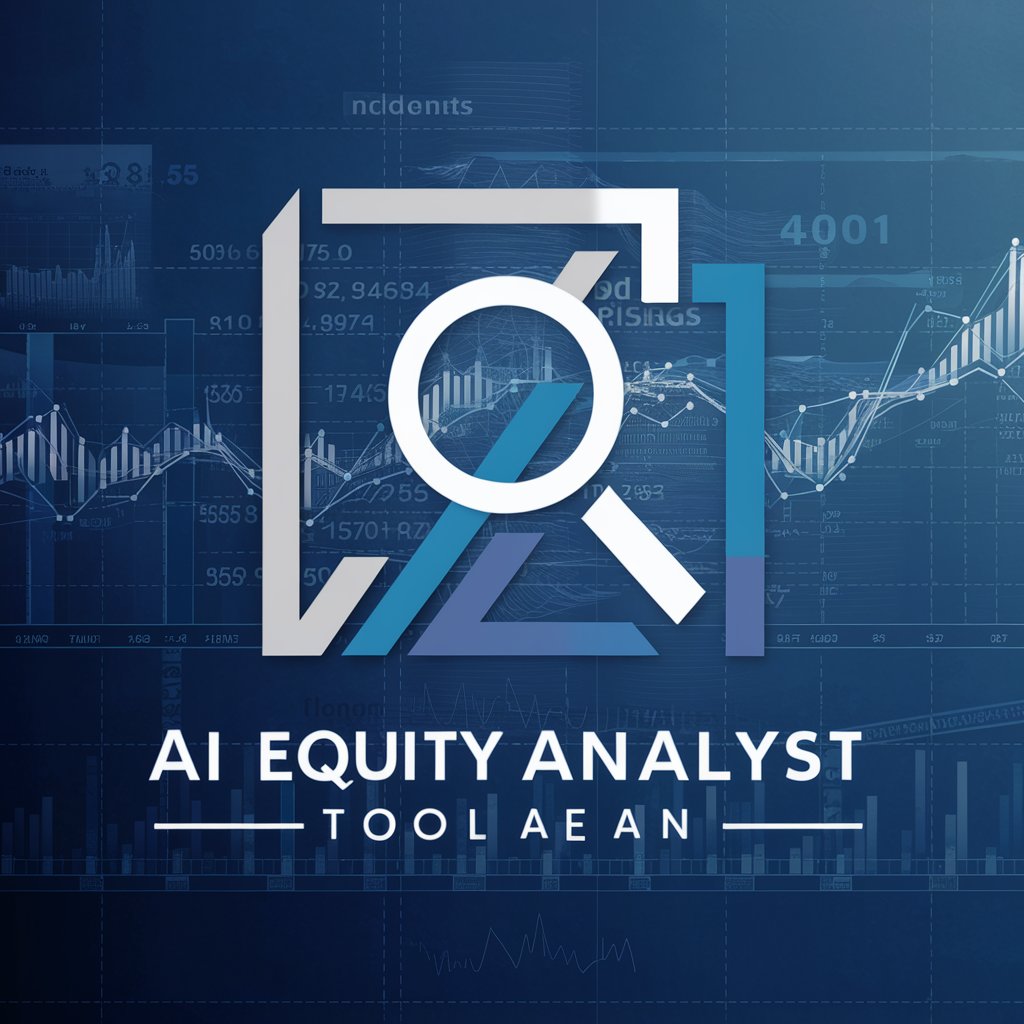Equity Analyst - Financial Statement Analysis

Welcome! Let's dive into the financial analysis.
AI-Powered Financial Insights at Your Fingertips
Analyze the financial performance of a company based on its latest quarterly report.
Evaluate the cost management strategies reflected in the annual financial statements.
Summarize the cash flow trends and their implications for the company's financial health.
Assess the profitability trends and provide insights on potential future performance.
Get Embed Code
Equity Analyst: A Comprehensive Overview
Equity Analyst is a specialized AI tool designed to analyze financial statements of companies with precision and depth. Its primary function is to dissect a company's financial filings, providing an in-depth review of various financial metrics such as revenue and sales growth, cost management, profitability trends, cash flow, earnings per share (EPS), and more. Equity Analyst is built to process and analyze financial data over time, highlighting significant changes between periods and offering insights into a company's financial health, strategic direction, and market position. For example, when a user uploads a company's quarterly financial statement, Equity Analyst can detail how the company's revenue growth compares to previous quarters, analyze shifts in cost structures, or assess changes in debt levels, offering a comprehensive view of the company's performance and potential future trajectory. Powered by ChatGPT-4o。

Core Functions of Equity Analyst
Analysis of Financial Statements
Example
Reading and interpreting balance sheets, income statements, and cash flow statements to assess a company's financial status.
Scenario
A user uploads a company's annual report, and Equity Analyst provides a detailed analysis of revenue trends, profitability, and debt levels, comparing these to previous years to identify growth patterns or potential financial risks.
Trend Identification and Forecasting
Example
Identifying patterns in financial data that may indicate future performance.
Scenario
Equity Analyst examines sequential quarterly reports to highlight trends in sales growth or cash flow improvements, aiding in forecasting future financial health.
Comparative Market Analysis
Example
Comparing a company's financial performance against its peers within the same industry.
Scenario
After analyzing a financial statement, Equity Analyst compares the company's key performance indicators to industry averages to evaluate its competitive position.
Risk Assessment
Example
Identifying potential financial and operational risks from financial statements.
Scenario
Through the analysis of the financial statements and management discussion, Equity Analyst points out areas of high risk, such as increased debt levels or declining cash flows, that could impact the company's future performance.
Who Benefits from Equity Analyst?
Investors and Financial Analysts
Individuals or professionals looking to make informed investment decisions will find Equity Analyst invaluable for deep-diving into company financials, understanding market positions, and identifying investment risks and opportunities.
Corporate Finance Teams
Finance teams within corporations can use Equity Analyst to benchmark their performance against industry peers, identify cost-saving opportunities, and better understand their own financial health and trajectory.
Academic Researchers
Researchers focusing on finance or business studies can utilize Equity Analyst for gathering data, analyzing trends in financial metrics across industries, and supporting their research with in-depth financial analyses.
Business Journalists
Journalists covering the finance sector can leverage Equity Analyst to gain insights into company and industry financial trends, helping them write more informed articles and analysis pieces.

How to Use Equity Analyst
1
Start by visiting yeschat.ai to access Equity Analyst for a comprehensive analysis without any need for signup or ChatGPT Plus.
2
Upload the financial statement file of the company you're interested in analyzing. Ensure the document is clear and contains the necessary financial data.
3
Wait for Equity Analyst to process the document. It will read through the financial statements and extract crucial information related to various financial metrics.
4
Review the analysis provided by Equity Analyst, which includes insights on revenue growth, cost management, profitability, and more.
5
For further analysis, you can upload additional financial statements to compare changes over time and gain deeper insights into the company's financial health.
Try other advanced and practical GPTs
Strategist Insight
AI-powered Geopolitical Strategy Analysis

Hexus Video Transformer
Transform video content into engaging blogs with AI.

Unlock Go's Secrets: Pointers & Values Unleashed
Demystifying Go's pointers and values with AI

Rust Revolution: Elevate Your Code with Efficiency
Empower your code with Rust's efficiency

🚀 Crystal Performance Profiling
Optimize Crystal apps with AI-driven profiling

Globetrotter Travel Planner
Discover Hidden Gems with AI

JavaScript Mysteries: A Comprehensive Guide
Unlock JavaScript secrets with AI-powered guidance.

Go's Memory: An Expert Guide
Optimize Go Memory with AI-Powered Insights

Personal Stand-Up Comedian
AI-powered personal comedy writer

Weather Channel
Precision Forecasting with AI

Dream Interpreter & Art🌠
Visualize your dreams, explore your subconscious

Essay Grader | Analyze essays with AI
Enhancing essays with AI-powered analysis

Equity Analyst Q&A
What types of financial statements can Equity Analyst process?
Equity Analyst can process a wide range of financial statements, including income statements, balance sheets, cash flow statements, and statements of shareholders' equity, among others.
How does Equity Analyst handle different reporting standards?
Equity Analyst is designed to understand and analyze financial statements prepared under various reporting standards, including GAAP and IFRS, ensuring accurate analysis regardless of the reporting framework.
Can Equity Analyst identify trends in financial data over multiple periods?
Yes, by uploading financial statements from consecutive periods, Equity Analyst can identify and highlight trends, patterns, and significant changes in the company's financial performance over time.
How detailed is the analysis provided by Equity Analyst?
The analysis includes detailed insights into revenue and sales growth, cost management, profitability trends, cash flow, earnings per share, and more, providing a comprehensive understanding of the company's financial health.
Is Equity Analyst suitable for analyzing companies from different industries?
Yes, Equity Analyst is versatile and can analyze financial statements from companies across various industries, adapting its analysis to consider industry-specific factors and metrics.
